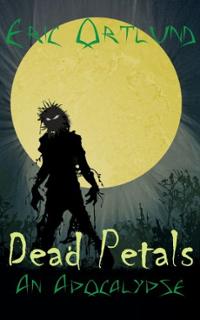Eric Ortlund teaches Hebrew and biblical studies at Briercrest College and Seminary in Saskatchewan, Canada. He’s also fascinated by modern fantasy, horror, and ancient myth. Eric has interwoven these disparate interests into his new novel, Dead Petals. Zombie tales and Biblical scholars fascinate me, especially when they collide. So I hunted Eric down and grilled him about this unusual confluence. The following is the record of that convo.
* * *
MIKE: Thanks for shambling by, Eric! The Amazon summary describes Dead Petals as “a different species of zombie tale.” In what ways is your new novel different than the more traditional zombie tale?
 ERIC: While I did work to stay within genre conventions—and while I really do enjoy the gritty, claustrophobic feel of classic survival zombie stories—I tried to distinguish my version in a couple of ways. First, my version of the monster can’t be killed: they just grow back if damaged. Since a straightforward survival story would involve a lot of hacking and shooting, this really limits the options of the survivors. Second, my version of the monster changes multiple times, physically and “psychologically.” (I really do like zombies, but they shuffle and moan and eat and that’s it. One of the challenges in writing was that you have to keep the monster popping up, since that’s the main attraction of the show—but keep him on stage too long and he stops being frightening. I’m hoping my version of the monster is more interesting and complex, and a more complex challenge for the survivors.)
ERIC: While I did work to stay within genre conventions—and while I really do enjoy the gritty, claustrophobic feel of classic survival zombie stories—I tried to distinguish my version in a couple of ways. First, my version of the monster can’t be killed: they just grow back if damaged. Since a straightforward survival story would involve a lot of hacking and shooting, this really limits the options of the survivors. Second, my version of the monster changes multiple times, physically and “psychologically.” (I really do like zombies, but they shuffle and moan and eat and that’s it. One of the challenges in writing was that you have to keep the monster popping up, since that’s the main attraction of the show—but keep him on stage too long and he stops being frightening. I’m hoping my version of the monster is more interesting and complex, and a more complex challenge for the survivors.)
A third difference is that the group of survivors which form the novel’s main characters keep changing, in addition to the monsters, in ways beautiful and sometimes scary. (Why this happens is explained later.) Finally, as the story progresses, and for complicated reasons, even the nature of the post-apocalyptic world itself continues to change. It always bugs me how a massive change like a zombie apocalypse can happen, and then everything stabilizes. I wanted everything to go fluid, everything to be up for grabs—even the story-rules that govern how the fantasy world works.
MIKE: Sounds fascinating. So what first interested you in writing about zombies?
ERIC: To be honest, I’m not entirely sure. I started to get interested after moving from Scotland to the Canadian prairies. It was unsettling to find myself in the midst of such vast emptiness. Although the people in the prairies are really nice, and although a zombie apocalypse was not really a very suitable metaphor, at some level, I *needed* that kind of story at that point in my life.
The other spark for me was the blurring of the boundary between the  undead and survivors in George Romero’s movies (which I consider to be canon). It fascinates me how he shows the monsters acting in eerily human-like ways, and the survivors acting in thoughtless, rapacious, violent ways. For me, that’s the real horror! I think, at some level, we (or at least I) tend to identify with/recognize both survivor and monster. At some level, I am an endlessly hungry dead thing; but I’m also watching to see how I might survive that evil. And it got me thinking about what the apostle Paul says about humanity being dead in sin in Ephesians. Then I wondered, if a zombie could talk while still undead, what would that sound like? Then the writing started happening.
undead and survivors in George Romero’s movies (which I consider to be canon). It fascinates me how he shows the monsters acting in eerily human-like ways, and the survivors acting in thoughtless, rapacious, violent ways. For me, that’s the real horror! I think, at some level, we (or at least I) tend to identify with/recognize both survivor and monster. At some level, I am an endlessly hungry dead thing; but I’m also watching to see how I might survive that evil. And it got me thinking about what the apostle Paul says about humanity being dead in sin in Ephesians. Then I wondered, if a zombie could talk while still undead, what would that sound like? Then the writing started happening.
MIKE: Zombie lore has become incredibly popular in culture. From your perspective, what’s behind the craze? Why do you think we keep coming back to the zombie archetype, why shows like The Walking Dead and zombies in pop culture have blown up?
ERIC: There are so many possible answers! In addition to the spiritual dimension which I mentioned above, zombies are the ultimate consumer, right? (In that sense, they again act as a mirror.) And there’s the political dimension. The Walking Dead seems to be asking: if resources are scarce and the world dangerous, how will humans react? And the answer seems to be: form tribes which prey on each other. (I love how the real danger in that show is the other humans.)
 I suppose another attraction is that it gives expression to our sense that the world is not as it appears—it is not as nice and stable as it likes to pass itself off as being. I genuinely think the world of the zombie apocalypse is not too terribly different from the “real” world. Someone on a zombie walk can be attempting to peel back the nice veneer on things, to identify themselves and re-define the meaning of the world. (And I suppose a zombie walk might also be an attempt to charm that horror, to lessen it—because, after all, you’re with your friends, and you can all wipe the makeup off and go home.)
I suppose another attraction is that it gives expression to our sense that the world is not as it appears—it is not as nice and stable as it likes to pass itself off as being. I genuinely think the world of the zombie apocalypse is not too terribly different from the “real” world. Someone on a zombie walk can be attempting to peel back the nice veneer on things, to identify themselves and re-define the meaning of the world. (And I suppose a zombie walk might also be an attempt to charm that horror, to lessen it—because, after all, you’re with your friends, and you can all wipe the makeup off and go home.)
MIKE: You teach Hebrew and biblical studies. That seems like an odd background for someone writing about the undead. How has your academic interests influenced your take on zombies, the apocalypse, and ultimately your novel?
ERIC: The influences are many. First, the Old Testament is the first apocalypse—i.e., it first got that particular way of looking at reality going. Second, the OT has a fund of cosmic symbols (the abyss, the storm, the holy mountain, the tree) which cannot be translated or decoded without essential loss. They stand, mute and resonant, and parts of the novel are really only imitative in that sense. (If a genius like Neil Gaiman does it with other ancient texts, I’ll at least try.) Third, the OT has this really interesting way of protesting the surrounding idolatrous culture and also “highjacking” it—taking over symbols and themes and images and using them to talk about the real God. I think the horror genre has so many insights, which I’m trying to highjack for perhaps a different purpose.
MIKE: One Christian author, in writing about the limits of speculative fiction, recently suggested that zombies should be out of bounds for Christian fiction because there is no biblical precedent for the soulless dead returning to life. So unless the fictional cause of zombie-ism is viral, zombies should be absent from Christian lit. It led me to ask how much theology we Christian writers should impose upon our fiction. Your thoughts?
ERIC: I’m going to try to stay calm here, but (1) I disagree that there’s no biblical precedent for the soulless dead returning to life (2) this is a curiously literal-minded way to read the Bible. The whole sticking point to literature is to metaphorical-ize, to say, “Imagine it this way.” Is the fact that there’s no biblical precedent for talking lions who die for traitors to be used against Narnia? Really? Or does the lack of any biblical precedent for magic rings mean Tolkien never should have broken our hearts and opened our eyes with his work? Does the author seriously think that when I stand before God, the Almighty will be saying, “Tisk, tisk, Eric. Show me chapter and verse for every idea or don’t talk about it!” Seriously?
In my opinion, how the author portrays reality working is far more important. And now we’re back to the apocalypse idea.
* * *
So there’s a glimpse into the brain of a biblical scholar / zombie novelist. Scary, huh? As an added bonus, Eric has graciously offered to give away a signed paperback copy of Dead Petals to one lucky commenter. If you’re interested, just leave a comment on this post and Monday, one name will be randomly chosen. Thanks again, Eric!














Sounds like a good time to me! Great to see Christian brothers writing.
If one more Christian writer mentions Lewis and Tolkien, I’m going to come unglued. Well, maybe not. But it’s like an incantation or something to ward away dissenters. But otherwise interesting interview.
This.
I love this interview! I am a pastor who is writing a zombie novel with another guy right now. Thanks for the post!
Fabulous stuff.
“…the OT has this really interesting way of protesting the surrounding idolatrous culture and also ‘highjacking’ it—taking over symbols and themes and images and using them to talk about the real God.”
I never tire of hearing how the Word of God inspires fiction writers. Everyone sees different things, and they’re all precious and amazing. I love how in varying ways and amounts, we carry over the strength and resonance of the Word into our fiction. I always picture God delighting in our insights and how we creatively mesh them with the ideas He gives us.
I wonder if He is like an artist who constantly delights in how the brush hairs and paint and water and air interact to create different effects. Yes, the artist knows what he’s doing and makes beautiful work… and yet even he is delightfully surprised at how the details work themselves out.
Great interview, Mike, and thanks for introducing us to Eric. Looking forward to reading Dead Petals and experiencing it for myself; definitely intrigued by the description of it.
I’ve had the privilege of publishing two of Eric’s short stories – he’s an imaginative writer and wonderful wordsmith. He brings not only creativity to the horror genre but a spirituality that infuses his work with worthwhile themes, not the simplistic religious pablum that sometimes passes for Christian fiction. Here are the links if anyone is interested:
http://www.fearandtremblingmag.com/2011/11/everyone-has-holes/
http://www.fearandtremblingmag.com/2011/06/him/
Thanks for posting those Lyn.
Great interview Mike. I would love to hear more from him in these topics!
Great interview, Mike. I’m always blessed when you are able to query the minds of other Christian writers, that they can be shared with the rest of us.
I actually disagree with the criticisms of ‘incantation’ per Lewis and Tolkien. I think it’s an honest appeal that needs to be dealt with by those who challenge the appeals. It’s true that much Godly literature has been created while using very non-literal allegory to teach spiritual truth. The use of allegory was borrowed from the Bible. It was an established way of teaching in the ancient near east. Jesus used allegory in His parables. God used allegory in the dreams that Daniel interpreted. He used them in the dreams that Joseph interpreted. John used them in Revelation. Job used them in his laments, and also in his prophetic calls to God’s salvation.
Pilgrim’s Progress was pretty much all allegory. It just gets a pass on allegory because it wasn’t so supernatural. I find it odd when people applaud Christian allegory, but disdain supernatural allegory. I mean, it is the supernatural we’re describing through allegory. What better medium to use as allegory?
I wrote a post about this recently on my blog, but won’t directly spam your board. lol
Thanks again, Mike.
AJ
I love this blog, Mike, though I don’t think I’ve ever commented here (I’m one of those lazy feed-reader…uh…readers). Thanks for posting on yet another thought-provoking topic, and a great interview! Looking forward to reading Dead Petals, whether I win the free copy or go buy it myself. 🙂